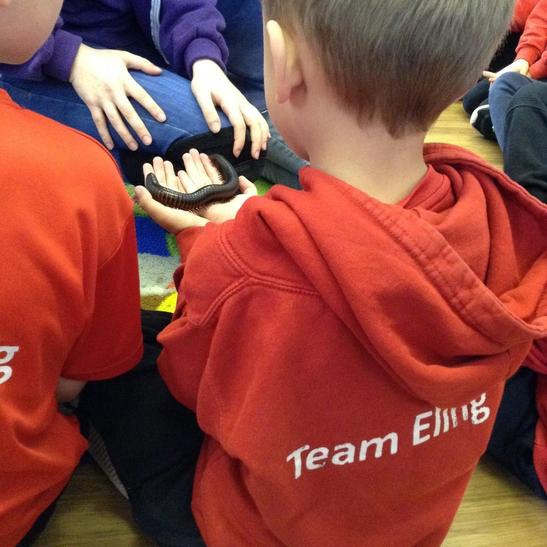Science
Intent
At Eling Infant School we believe that a high quality Science education equips children with the foundations for everyday life. The Scientific Area of Learning aims to increase children’s knowledge and understanding of the world, and develop skills associated with Science as a process of enquiry. The children are encouraged to be inquisitive, creative and use a range of skills associated with working scientifically, including questioning, researching and observing for themselves. Our Science curriculum fosters a healthy curiosity in children about our universe and promotes respect for the living and non-living.
Our teaching aims to bring about a sense of awe and wonder, and encompasses the acquisition of knowledge, concepts, skills and positive attitudes. We ensure that skills and vocabulary are built upon and developed from Early Years Foundation Stage (EYFS) to the end of Key Stage 1 (KS1). We aim to develop these skills to a suitable level both in preparation for Key Stage 2 and beyond that, to understand the uses of Science in the future.
Our broad and balanced Science curriculum is fully inclusive and accessible for every child, whilst ensuring they become ‘well-rounded’, caring and responsible citizens. We aim to develop independent, confident and enthusiastic young Scientists who enjoy scientific learning and discovery

Implementation
To ensure high standards of teaching and learning in science, we implement a curriculum that is progressive throughout the school, allowing the children to embed their learning over time. Our planning and teaching of Science ensures full coverage of the 2014 ‘National Curriculum programmes of study for Science’ and ‘Understanding the World’ in the Early Years Foundation Stage.
Wherever possible, Science is linked to the topic of the half term to fully immerse the children in the themes and to enable the achievement of a greater depth of knowledge. In KS1, Science is taught consistently as discrete lessons once a week, in order to give the subject the prominence it deserves. Due to our classes containing mixed year groups, Science follows a 2 year cycle which ensures progression between year groups and guarantees that all areas of the curriculum are covered each year. In EYFS, Science is taught through the children learning about the world around them in their learning through play. We promote and develop the use of transferable skills such as observation, communication and teamwork, and allow mathematical skills to be applied.
Through our planning, we involve problem solving opportunities that allow children to find out for themselves. Children are encouraged to ask their own questions and be given opportunities to use their scientific skills and research to discover the answers. This curiosity is celebrated within the classroom. Planning involves teachers creating engaging lessons, often involving high-quality resources to aid understanding of conceptual knowledge. Teachers use precise questioning in class to test conceptual knowledge and skills, and assess children regularly.
We build upon the learning and skill development of the previous years. As the children’s knowledge and understanding increases, and they become more proficient in selecting, using scientific equipment, collating and interpreting results, they become increasingly confident in their growing ability to come to conclusions based on real evidence. Working Scientifically skills are embedded into lessons to ensure these skills are being developed throughout the children’s school career and new vocabulary and challenging concepts are introduced through direct teaching. This is developed through the years, in-keeping with the topics.
Our teachers demonstrate how to use scientific equipment, and the various Working Scientifically skills in order to embed scientific understanding. We find opportunities to develop children’s understanding, whilst keeping it accessible and relevant, by accessing outdoor learning and planning trips to enhance what the children have been taught at school. Children are offered a wide range of extra-curricular activities, visits, trips and visitors to complement and broaden the curriculum.
At Eling we use floorbooks to record the learning that has taken place in Science lessons.
A floorbook is a large book for recording children's individual and collaborative learning. Floorbooks are used as a strategy for developing and assessing childrne's understand of Science and can be used with any age group. Our floorbooks include photos, children's comments, drawings, tables, graphs, annotated diagrams, classification keys and writing. Having a whole class record means its easier to track changes in children's ideas and understand how children are developing their understanding of Science.
Please click here for a link to the Primary Science Trust website which explains the use of floorbooks in more detail.
Impact
The impact and measure of this is to ensure children not only acquire the appropriate age-related knowledge linked to the Science curriculum, but also skills which equip them to progress from their own starting points, and within their everyday lives. The children will have gained a wider variety of skills linked to both scientific knowledge and understanding, and scientific enquiry skills. They will have a richer vocabulary which will enable them to articulate their understanding of taught concepts. Finally, they will enjoy being ‘Scientists’ and leave us with a thirst for more knowledge, which will stay with them well into the future.
Reviewed by Subject Leader (September 2024)
